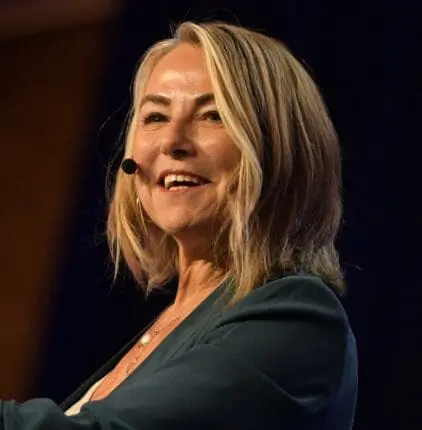When I wrote Mating in Captivity, I struck a nerve with readers because it focused on something many people recognized in their own lives but hadn’t quite put into words: we want our partner to be our best friend, trusted confidante, equal parent, intellectual mate, and passionate lover.
In other words, we expect the same person to provide safety and excitement, comfort and edge, continuity, and surprise.
In effect, we want one person to give us what once an entire village used to provide.
While this isn’t impossible, it certainly isn’t instinctive, nor is it intuitive.
Our therapeutic culture “solves” the conflict between the drabness of the familiar and the excitement of the unknown by encouraging clients to really get to know their partners.
But I often tell my clients that knowing isn’t everything. Eroticism can draw its powerful pleasure from fascination with the hidden, the mysterious, the suggestive…
I’m not suggesting they try to hide from their partners. I’m challenging their assumption that they already know everything there is to know about their mate. I see my job as trying to highlight for them how little they’ve seen, urging them to recover their curiosity and catch a glimpse behind the walls that encircle the other.
I also see my job as challenging many widely accepted myths surrounding intimate relationships that we must move past…
Such as “women want intimacy, and men just want sex.”
Or the variant that women cheat for love, escaping loneliness; and men cheat for sex, hungry for variety and to escape boredom.
She may say, “All he wants is sex.” But maybe for him, sex is actually the gateway to his deepest emotional place. After sex, he can open up, not because he got laid, but because sex is his language.
Surprisingly, in all my training as a couples therapist, no one taught me about human sexuality. And you can’t do couples therapy that really helps people achieve more intimacy without exploring the sexual dimension of human connection.
Attachment and sexuality are each evolution-based, neuro-bio-psycho-social systems. Distinct though interrelated, they represent different ways for adults to connect with one another.
As a rule, clinicians who focus on attachment have tended to pay less attention to sexuality and vice versa. I sought to reconcile both. I explore love and desire, how they relate and how they conflict, for therein lies the mystery of eroticism.
When I work with couples, I don’t have a technique or a method: I have an approach.
Fundamental to my approach is helping couples understand how they’re shaped by larger social and cultural forces that guide our individual needs and become the scripts with which we interpret our experiences.
As therapists, we need to recognize that we’ve always experienced pain, joy, and fears, but the way we narrate and interpret our suffering and the meaning we give to our fears is shaped by the time and place where our dramas unfold.
Your grandmother didn’t have the opportunity to think about her choices in the way we do today. No one ever asked her if she enjoyed sex; it was just part of her marital duty. A happy marriage for her meant something quite different from how we evaluate ours today.
The therapy I practice is experiential and aims to be transformational. Ideally, you can’t leave my office the same way that you walked in. You come in with a story and need to leave with another, and for that you need a new experience. That means enactment. People get up, they move around, they touch.
Clients who wind up coming to me want to free themselves. They want to feel more joy, feel more playful. They want to take risks. They want somebody to give them the permission and tools to feel and act differently.
That doesn’t mean I advocate any particular way to be in a relationship, but I’m willing to create a space for people to explore the things they often feel they can’t talk about anywhere else.
I believe therapy should be a place that’s very bold and free of judgment.
I’m big on relational accountability, but I’m willing to let people step outside of the strict ways that dictate how to be married today…
Statistics tell us more than half of marriages don’t succeed. If Apple sold a product that fails 50 percent of the time, would you buy it?
There are couples who really get along super well and love their family, and at the same time, haven’t touched each other in six years? Simply strengthening the emotional closeness is often not sufficient, and many therapists know that.
That’s why I developed an intensely experiential approach for working with sexuality that’s been transforming relationships throughout the world…
…and now I want to teach you my approach.
In my Master Class, Esther Perel’s Transformative Approach to Couples Therapy, you have the opportunity to observe my work in action by sitting in on three real-life couples sessions dealing with infidelity, sexual incompatibility, and the impact of childhood trauma.
When couples seek our help, we can’t just sit back and let them rehash their repeated conflicts and bring out the worst in each other.
We need to help them explore new possibilities and experience creative solutions that free them from whatever’s keeping them stuck.
Click here to learn more about Esther Perel’s Transformative Approach to Couples Therapy in Action!
Esther Perel
Psychotherapist and New York Times bestselling author Esther Perel is recognized as one of today’s most insightful and original voices on modern relationships. Fluent in nine languages, she helms a therapy practice in New York City and serves as an organizational consultant for Fortune 500 companies around the world. Her celebrated TED talks have garnered more than 40 million views and her international bestseller Mating in Captivity: Unlocking Erotic Intelligence became a global phenomenon translated into more than 30 languages. Her newest book is the New York Times bestseller The State of Affairs: Rethinking Infidelity (HarperCollins). She is a Licensed Marriage and Family Therapist, an AASECT certified sex therapist, a member of the American Family Therapy Academy and of the Society for Sex Therapy and Research. Esther is also the host of the hit podcast “Where Should We Begin?” which is available on Apple Podcasts. Her latest project is “Where Should We Begin – A Game of Stories with Esther Perel.” Learn more at EstherPerel.com.














